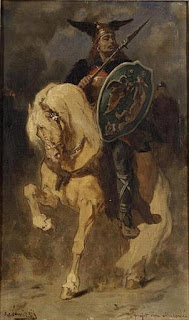What do you do when a dynasty seems to become useless? You name them
Le Rois fainéants (The do-nothing Kings).
The Merovingians are the descendants of Merovech or Merovius, a semi-legendary figure whose father was—according to various reports, such as the
Chronicle of Fredegar, expanding on something said by Gregory of Tours—a sea deity. Whatever the case, his son Childeric I (c.457-481) was known to be leader of the Salian Franks, and
his son Clovis I united all of Gaul.
The Salian Franks came to an agreement with the Roman Empire. The Salians settled in what had been Roman territory at one time, built a decent political alliance with Rome, and slowly adopted some Roman culture, shifting from the reputation of the Germanic tribes as uncouth and warlike. When Attila and his Huns became a problem for Rome, the emperor was able to call on the Salian Franks—by now well-established as the Merovingian dynasty—for aid, ending the threat to Europe from the Huns.
The adoption of Christianity was another trend that helped change the composition of Frankish culture in Gaul. Although Goths and others adopted the heretical
Arianism, the
baptism of Clovis cemented ties between the Frankish kingdom and Roman Catholicism, giving them the support of the Pope as well as the Emperor.
Clovis' thirty-year rule may have been the high point of the dynasty, however. The Salic Law confirmed royal inheritance exclusively to male descendants, but not limited to the eldest. Clovis' kingdom was divided among his four sons upon his death. Sibling rivalry often turned into civil war among Clovis' descendants. Even worse: over the next two centuries, these frequent struggles between adjacent sub-kingdoms and the desire to reunite them under one banner had an unintended consequence. Young heirs sometimes became tools of strong military leaders who wanted to cement some power for themselves but needed a divinely anointed king under which to do it. By the 7th century, with much of Frankish land brought together again, the Merovingian line became a series of weak kings who seemed disinterested or simply unable to take control and do anything notable. From 675 (Clovis III, king of Austrasia for one year) to the death of Theuderic IV in 737 (after which the throne was empty for seven years), there were a half-dozen kings of the Franks who are called
le rois fainéants because of their uselessness and complete lack of administrative agenda or ability. It was a sad ending to what might have been a noteworthy dynasty in that part of the world.
So...what if you
were a competent administrator working in the palace, seeing the problems and wishing you could help get the kingdom back on track? Well, if you are a top administrator with the nickname "Charles the Hammer," you take things into your own hands—for the good of the kingdom, of course. That's a good story for tomorrow.
